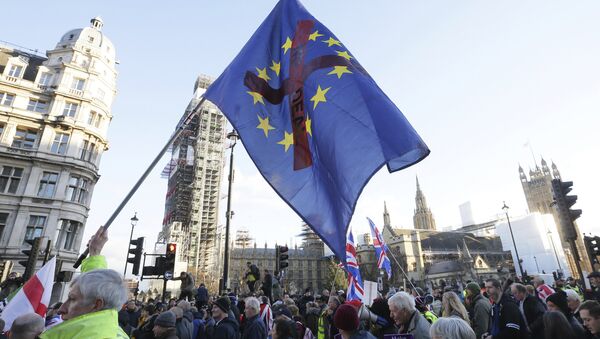If he were around today, he'd be watching the enormous and quite deliberate mess the political class are making of implementing the 2016 referendum result on leaving the EU, and saying to us with a wry smile on his face ‘I told you so!'.
‘The people of Britain are what is called a Democracy' said Moung Ka.
‘A Democracy?' questioned Moung Thwa. 'What is that?'
‘A Democracy', broke in Moung Shoogalay 'is a community that governs itself according to its own wishes and interests by electing accredited representatives who enact its laws and supervise and control their administration. Its aim and object is the government of the community in the interests of the community‘.
‘Then', said Moung Thwa, turning to his neighbour, ‘if the people of Britain are a Democracy..‘
‘I never said they were a Democracy', interrupted Moung Ka placidly.
‘Surely we both heard you! Exclaimed Moung Thwa.
‘Not correctly' said Moung Ka; ‘I said they are what is called a Democracy'.
Saki's short story ‘The Comments of Moung Ka' was written over a hundred years ago, but it remains stunningly relevant to what's going on in British politics in 2018.
In the story, the government of India, which is not called a ‘democracy', listens to its people and annuls the partition of Bengal. But the British government — which is called a democracy — 'shuts its ears to what the people may wish' and decides on the partition of Britain.
READ MORE: LIVE UPDATES: May to Discuss Brexit in Brussels After Surviving Confidence Vote
The opinions of the British people are ignored because Britain is a Parliamentary democracy.
It should have been the end of it but it wasn't. The problem, from the point of view of our MPs, is that the voters made the ‘wrong' decision. Our elected representatives aren't too keen on Brexit, so have been out to obstruct it, water it down, or block it all together. They are not carrying out what the public wanted, but what they want.
That is fundamentally undemocratic. Ah, I hear you say, but what about the calls for a ‘People's Vote? Well, does anyone seriously doubt that if one is held and people opt for 'Brexit' again, we won‘t be told we need another one, and will have to keep on voting until we vote the ‘right' way?
Rather than enhancing democracy in Britain, Parliament actually curbs it. MPs, because of their class and professional backgrounds, tend to be more supportive of neo-liberal globalisation than the public at large. They are also more ‘liberal' on social/cultural issues. They are more pro-EU. More pro-US, pro-Israel, pro-Saudi and more anti-Russian. And more pro-war, as the last twenty years has shown.
READ MORE: Boris Johnson Draws Unexpected Parallels Between His Weight Loss and Brexit
Even when Parliament does condescend to listen to us peasants, the numbers don't reflect where public opinion is. In 2013 there was another push by the Endless War lobby to attack Syria. The public was strongly opposed- with opposition ranging between 70%-90%- and they bombarded MPs with letters and emails. MPs did vote against air strikes- but only narrowly, (the result was 285-272) and the neo-con 'liberal-interventionist' punditocracy were incandescent with rage that just for once, a vote had gone against them. If Parliament had been truly democratic though, the margin would have been much greater.
The irony as ‘The Comments of Moung Ka' alludes to, is that governments which aren't regarded as ‘democratic' in the western sense, can actually be better listeners than ones which are. A benign ‘dictatorship' can sometimes give more to its people than a much-lauded representative ‘democracy', which holds regular 'free elections', does. Acknowledging this is to break a taboo.
Compare the experiences of people living in the Soviet Union/Russia in the 1980s with the 1990s, when ‘shock therapy', imported from the US, traumatised vast swathes of the population under the utterly corrupt ‘democrat‘ Boris Yeltsin. Even Joseph Stiglitz, the former Chief Economist of the World Bank, admitted in 2002: ‘For the majority of those living in the Soviet Union, economic life under capitalism has been even worse than the old communist leaders said it would be'.
The French Yellow Vest movement has already achieved far more for ordinary people after a couple of weeks of street protests, than talking heads in Parliament (which does, after all, come from the French verb 'parler',), would have achieved in years. Unsurprisingly Les Gilets Jaunes have been traduced by those who are terrified about real democracy- unfiltered, uncensored and raw- breaking out.
There are, it must be said, some very good MPs who do represent the public and listen to our views. But by and large, our ‘representatives' are there to ignore us, as Saki warned all those years ago.
The views and opinions expressed in this article are solely of the author and do not necessarily reflect those of Sputnik.
Follow Neil Clark @NeilClark66 and @MightyMagyar
Support his AntiStalker CrowdFund






